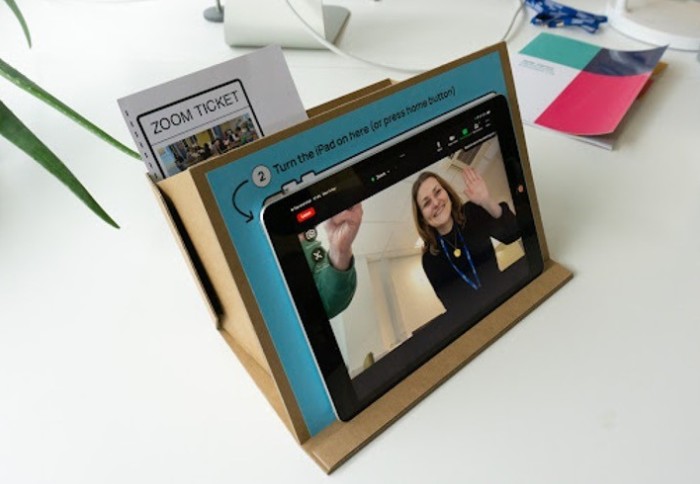Supporting dementia care toolkit launched
by Meesha Patel

The online toolkit aims to guide and encourage the adoption of digital engagement approaches as part of the Digital Inclusion Innovation Programme.
The Digital Inclusion Innovation Programme, run by the Greater London Authority and the London Office for Technology and Innovation (LOTI), aims to support Londoners who are digitally excluded and are particularly vulnerable since the COVID-19 pandemic.
As part of this programme, LOTI and the Helix Centre at the Institute of Global Health Innovation, undertook a London-wide project to co-design and pilot new ways to provide community dementia support.
The designers worked with people living with dementia to create a straightforward way for inexperienced users of technology to access Zoom calls. They developed the ‘Tap and Chat’ digital befriending kit, which makes it easy to use a standard computer tablet for video calls. The designers collected their learnings from creating this befriending kit to produce a toolkit to help other innovators to tackle digital exclusion.

The designers hope this toolkit will encourage the adoption and engagement of digital tools for other digitally excluded Londoners. The toolkit is hosted on the LOTI website.
Matt Harrison, Senior Designer at the Helix Centre said: “Through this toolkit, we want to share what we learnt from co-creating the digital be-friending kit to inspire others to use our ideas and insights. Digital exclusion causes several problems for vulnerable people as they try to connect with both healthcare services and friends and family.
“While we focused on the creation of our befriending kit for people with dementia, there are wider opportunities to extend these learnings to other digitally excluded populations who could benefit from new innovations.”
Co-creating a digital befriending kit
The ‘Tap and Chat’ digital befriending kit created by the Helix Centre consists of a tablet, a cardboard tablet stand, a printed Zoom ticket and a ‘Tap and Chat’ app which scans printed tickets and allows users to access a Zoom call.

The components of the kit were tested with the process of co-creation, which involves using the kit with community groups, participants with dementia and health partners to seek their feedback. This allowed the researchers to refine the kit before launching a 4-week pilot programme.
Participants responded positively to the kit based on successful engagement in online focus groups. However, the researchers highlight that there is still more work to be done on engaging people who don’t have access to carers.
Alice Gregory, Design Associate, Helix Centre said: “Our ambition was to create a designed intervention that could help people living with dementia and their carers, who have little technical literacy, to engage with social activity online.
“While the overall result was positive, there is more to do to reach people with dementia who are living alone, and with more time this approach, alongside greater levels of in-person individual training and support, would show promise.”
"While the overall result was positive, there is more to do to reach people with dementia who are living alone" Alice Gregory Helix Centre, IGHI
Genta Hajri, Delivery Lead: “Digital Innovation at LOTI said: "LOTI is pleased to have worked with the Helix Centre, Imperial College London, dementia support organisations and London boroughs in testing digital approaches for getting people living with dementia engage online.
“The methodology and tools we used as well as lessons learned are captured in this comprehensive toolkit. We hope it will support other professionals who are thinking of developing hybrid engagement not only for people living with dementia but also for other citizens who may experience social isolation.”
The Helix Centre is an innovation lab working at the heart of healthcare translating research into products that improve health outcomes. Its mission is to achieve high-quality care for all, worldwide and at scale. Helix is an interdisciplinary group of designers, technologists, clinicians and researchers that uses human-centred design to rapidly dissect problems, identify opportunities and develop clinically-evaluated digital solutions.
LOTI was launched in 2019 as a collaboration between London local authorities with the support of the Mayor of London. Hosted by the cross-party group London Councils, its aim is to help the boroughs work together on projects that bring the best of technology, data and innovation to improve public services and outcomes for Londoners.
Article text (excluding photos or graphics) © Imperial College London.
Photos and graphics subject to third party copyright used with permission or © Imperial College London.
Reporter
Meesha Patel
Faculty of Medicine Centre